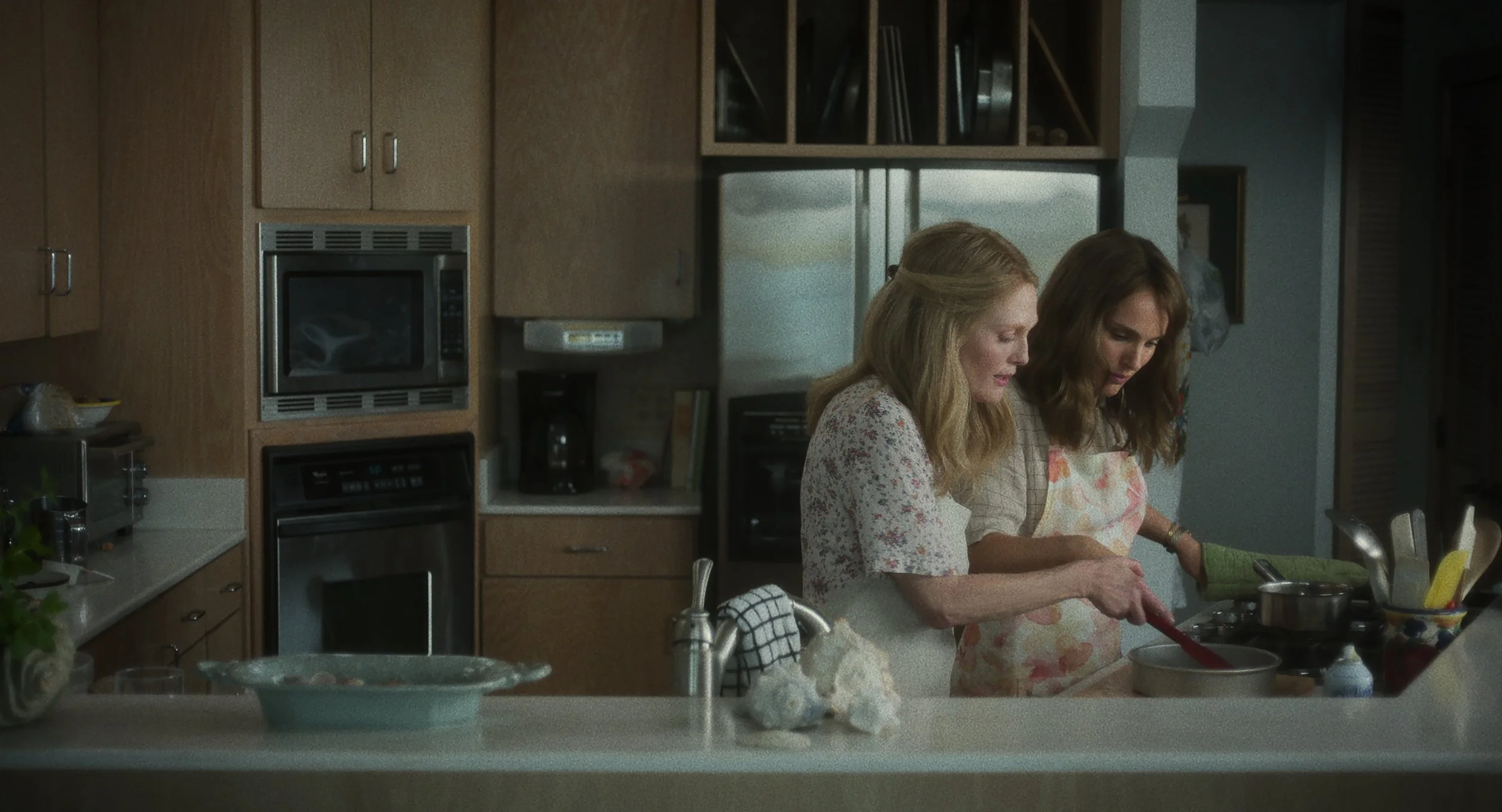May December (2023) | Dir. Todd Haynes
May December. Natalie Portman as Elizabeth Berry in May December. Cr. Francois Duhamel / courtesy of Netflix
Written by Naina Devgan
Photo Edited by Kit Matthews
Todd Haynes’s “May December,” tells the uncomfortable story of two extremely disturbed women. Elizabeth (Natalie Portman) and Gracie (Julianne Moore) meet at Gracie’s waterfront home where she hosts a barbecue for her picture perfect family and their friends. A kind gesture, Elizabeth brings Gracie a package left for her at the end of their driveway. Gracie opens this package, and nonchalantly tells Elizabeth it is a box of feces- something she and her husband, Joe, are sent fairly often.
May December. (L to R) Natalie Portman as Elizabeth Berry and Julianne Moore as Gracie Atherton-Yoo in May December. Cr. Francois Duhamel / courtesy of Netflix
Elizabeth, preparing to portray Gracie in an upcoming film, talks to Gracie, Joe, and their children to better grasp their story, one which was highly publicized in years prior. Joe, portrayed by Charles Melton, supports and is very patient with Gracie, who runs a bakery. The bakery is solely in function as people pity Grace, and order her cakes as an act of appeasement. Through Elizabeth's research of tabloids and interviews with peers, the story of how Gracie met Joe unfolds. She was caught having sex with him while working together at a local pet store when she was 36 and he was only 13. She gave birth to her and Joe’s first child in prison, before an eventual marriage and two additional children. Before Joe had even turned 18, his life path was forever set in place.
May December, L to R: Julianne Moore as Gracie Atherton-Yoo with Charles Melton as Joe. Cr. Courtesy of Netflix
Still, Gracie does an excellent job of hiding her villainous ways. She is hesitant to speak about her life before Joe, one which included a husband and a son of Joe’s age. It is unclear if Gracie is a phenomenal liar or if she is truly in denial about the pain she has caused both through her affair and sexual abuse. Elizabeth, determined to give the performance of her lifetime, pushes the boundaries of her observations. She meets Gracie’s forgotten family behind her back and pursues an unconventional relationship with Joe. In one scene, during a high school acting class, Elizabeth is asked by a class clown if she had ever filmed a sex scene before. Elizabeth’s response is inappropriately graphic. She says, “You start losing the line of, like, am I pretending that I’m experiencing pleasure, or am I pretending that I’m not experiencing pleasure?”.
May December, L to R: Natalie Portman as Elizabeth Berry, & Charles Melton as Joe Yoo. Cr. Courtesy of Netflix
This blurred line between performance and reality is solidified as Elizabeth begins to mimic Gracie’s movements. Specifically, she alters her voice and mouth patterns to mirror Grace’s- and even seduces Joe abusingly, seemingly failing to acknowledge Joe as a damaged person- rather than a character in her next movie. Left vulnerable by Elizabeth’s relentless questioning and manipulation, Joe too is forced to ponder how much of his life has been a performance. After years of denial he must ask himself, does he even know what he feels?
May December, Charles Melton as Joe Yoo. Cr. François Duhamel / Courtesy of Netflix
While being forced into adulthood by Gracie’s sexual abuse and pregnancy, Joe has also been forced into manhood by her constant emotional abuse and self-victimization. Yet as the film unravels, it becomes evident that Joe is still a boy. He, nevertheless, remains a father, husband, and doctor with minimal time for self-consideration. A stark comparison to his large stature and constant fetishization by female characters- he is an innocent, gentle human. He cries when he is yelled at and longs for approval from his widowed father, Gracie, and his children. His ignored fragility is symbolized through his passion for nurturing butterflies. In doing so, he escapes from his constant performance of a strong, providing man. It is clear, however, that the performance cannot go on much longer.
May December, L to R: Natalie Portman as Elizabeth Berry, Cory Michael Smith as Georgie Atherton. Cr. François Duhamel / Courtesy of Netflix
Portman and Moore do a disturbingly brilliant job playing their respective characters. Slowly, they morph into one another and reveal their similar manipulative ways, revealing the dangerous outcomes of losing sight of who we are and who we should be. However, the most notable portrayal comes from Melton, a relative newcomer in the industry. His devastating anguish, coupled with his child-like innocence, balance perfectly to portray a heart-breaking image. Specifically, that of a confused victim deprived of even the simple recognition of their victim status. In perhaps the most daunting scene, Melton and Moore recreate a real news interview from 1997 wherein Mary Kay Letourneau, torments her 12 year old past rape victim, repeatedly asking, “Who was the boss?”. Letourneau insists that she- despite her age- was the victim of her affair. Similarly, as Melton sobs in distress and confusion, even when faced with her husband’s long-awaited mental breakdown of her own actions, Gracie does not break from her performance. She maintains her victim status and leaves Joe in disarray.
May December, L to R: Julianne Moore as Gracie Atherton-Yoo with Natalie Portman as Elizabeth Berry. Cr. Courtesy of Netflix
Towards the end, Elizabeth is finally seen shooting the movie. Acting alongside a child whom they struggled to cast, she delivers a monologue derived from letters she found while snooping through Joe’s belongings. To quote Elizabeth, “I knew that we’d crossed a line and I felt in my heart that we would cross it again.”. She highlights both her and Gracie’s recognition of when they have gone too far, and their joint disregard for doing so. She insists on delivering the monologue repeatedly, appearing to take pleasure in “acting” attracted to the child. Calling back to the “losing the line” acting class scene- she highlights the confusing paradox between who we are and who we pretend to be.














